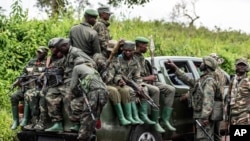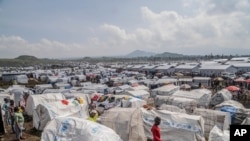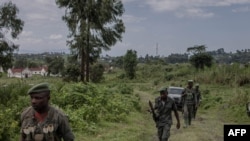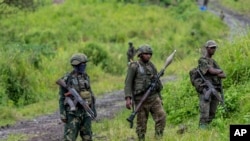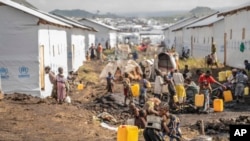On April 8, Rwandan President Paul Kagame criticized the Western countries and the Democratic Republic of Congo for accusing Rwanda of supporting the M23 rebel group, which has caused thousands of deaths while displacing over 7.1 million people.
Speaking to a group of international journalists in Rwanda, Kagame posed the following question to his accusers: “Why are we being accused of supporting M23?”
He went on to claim that the M23 rebels were fighting to defend the minority Tutsis of Rwandan origin who live in Congo:
“For those accusing us, actually, I should accuse them of not supporting M23 because it is as if they agree with the injustice that is being done to this community.’’
Kagame’s statement is misleading.
The United States has imposed multiple sanctions on M23 and its leaders for committing human rights abuses in the Democratic Republic of Congo.
During a February 20 U.N. Security Council briefing on the situation in the DRC, Ambassador Robert Wood, alternate U.S. representative for special political affairs in the U.N., said the United States “does not in any way support M23 and has repeatedly and publicly called for the government of Rwanda to end its support to this group.”
Wood called on the international community to “take immediate steps to end the fighting in eastern DRC and de-escalate tensions between the DRC and Rwanda," adding that millions of people “are already exposed to a grave humanitarian crisis” and that the “scale of displacement, human rights abuses, gender-based violence, and suffering is appalling.”
Three days earlier, the U.S. State Department had condemned Rwanda’s government for supporting M23 and called on it to “immediately withdraw all Rwanda Defense Force personnel from the DRC and remove its surface-to-air missile systems.”
The U.S. sanctioned M23 on August 28, 2023, and imposed financial sanctions on four of its senior commanders, a senior commander of the Rwanda Defense Force (RDF) and a senior commander of the DRC’s armed forces.
M23, made up primarily of ethnic Tutsis, was formerly part of the Congolese army. It is named after the March 23, 2009, peace treaty between the National Congress for the Defense of the People (CNP) and the DRC government.
In 2012, M23 took control of the city of Goma, the capital of the DRC's North Kivu province, which borders Rwanda, claiming the peace deal was poorly implemented. The DRC army and U.N. peacekeepers defeated M23, with its surviving combatants fleeing to Rwanda and Uganda.
In recent weeks, M23 rebels have been closing in on Goma, causing civilians to flee the area.
Contrary to Kagame’s claims that M23 is fighting for the rights of the minority Tutsis, the U.N. says the rebels violate the human rights of Tutsis, and that M23’s main interest is to control North Kivu’s mineral resources.
According to various U.N. reports, Kigali exploits Congo’s natural mineral resources through the M23 rebels.
In 2022, Congo said it was losing close to $1 billion a year in minerals smuggled into Rwanda.
In 2018, the U.N. sanctioned M23 and some of its leaders for serious violations of international law by targeting “women and children in situations of armed conflict in the DRC including killing and maiming, sexual violence, abduction, and forced displacement.”
On June 9, 2022, the Africa Center for Strategic Studies, which was founded and is funded by the U.S. government, cited “ample evidence” that rebel groups, including M23, “control strategic but informal supply chains running from mines in the Kivu into the two countries.”
It added that M23 and other rebel groups use proceeds from the trafficked gold, diamonds and coltan to “buy weapons, recruit, and control artisanal miners, and pay corrupt Congolese customs and border officials as well as soldiers and police.”
In a February 2023 report, New York-based Human Rights Watch (HRW) accused M23 of perpetrating human rights violations against civilians.
HRW interviewed 81 survivors between March and May 2023, who reported cases of “M23 fighters raping women in front of their children and husbands.”
In June 2023, HRW uncovered mass graves “containing scores of bodies found in the village of Kishishe, North Kivu province in eastern Congo.” The victims were “villagers and captured militia members that M23 fighters executed between November 2022 and the armed group’s departure from Kishishe in April 2023.”
On March 27, the U.N. special representative in the DRC, Bintou Keita, told the U.N. Security Council that 7.1 million people have been displaced in the DRC and “tens of thousands continue to flee from the violence there.”




